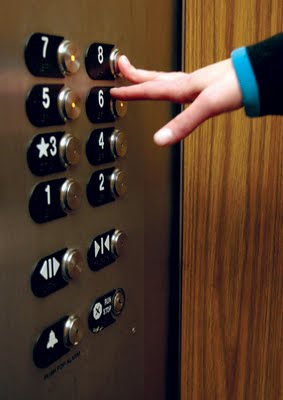This study makes no claims. But I bet other people will.

In the fitness industry, everyone’s trying to get or stay ahead. And while there are lots of ways to do that, tapping into published research is one of the more common ways to “reveal” something new and come across as being more leading edge than the next guy/girl.
I would argue that most people who post links to PubMed haven’t read the actual study, but are just browsing abstracts. I’ve written about what abstracts are good for in the past. But it’s been a while since I’ve really taken the theme up. Read More...
Screwed if you do, screwed if you don’t: People don’t want to read what they don’t want to hear

This WOULD be a catastrophe. This week, I was asked to write a commentary for Fitocracy on what has now become known as the “Red Meat Will Kill You” Study. The fallout in the blogosphere has been pretty dramatic (and by dramatic, I mean drama-filled and theatrical). There have been a few well-written, thoughtful commentaries, but by far, the bulk of criticism has been the general “correlation, not causation” crowd. While I think this is, by and large, a HYUGE step forward in general research literacy, it also makes me wonder if it’s just another sign of polarized, blinded thinking.
There is a fundamental difficulty with measuring long-term outcomes that are distantly removed from single-point events, and continuous repeated exposures. The three mainstream ways to get at the question of, “Does X make you live longer/shorter?” are: Read More...
Beta-alanine: The meta-analysis – 18 trials, still a marginal effect
 I’ve always thought a meta-analysis on beta-alanine was a good idea. So many of the trials have been underpowered, that it felt like weren’t getting anywhere fast. I wanted to be the one to do it, but life circumstances have kept me from focusing on much other than my main career. So it was a pleasant surprise to see that someone else had the same idea.
I’ve always thought a meta-analysis on beta-alanine was a good idea. So many of the trials have been underpowered, that it felt like weren’t getting anywhere fast. I wanted to be the one to do it, but life circumstances have kept me from focusing on much other than my main career. So it was a pleasant surprise to see that someone else had the same idea.
With just 11 weeks left before my exams though, I’m going to keep this blog entry brief. Read More...
Moment of weakness, act of strength

I’m in what is probably the most stressful period of my life right now, studying for my Canadian board exams. This means that I’m letting my “diet” slip to cope. The other day, while I feeling sorry for myself, I bought a bulk bag of chocolate mini-eggs. We’re not talking the package that you can hold in one hand; we’re talking the package that basically has a handle.
I’m not so far over the edge that I would eat a whole sack of chocolate eggs in one sitting yet. Give me a few weeks. But after a few handfuls, I realized that I had succumbed to a moment of weakness and that eating (eventually) this bag of delicious chocolate eggs really wasn’t in my best interest. There’s coping (a small package of chocolate eggs), and then there’s overcompensation. Read More...
Burn the boats: Why you’re going to fail. Or not.
 I’ve been studying and reading health research for decades, and this post is just a bit of my biased gestalt on the state of affairs on obesity, obesity research and the new hope that arises within a TON of people every January.
I’ve been studying and reading health research for decades, and this post is just a bit of my biased gestalt on the state of affairs on obesity, obesity research and the new hope that arises within a TON of people every January.
The preponderance of obesity research indicates that most of you will fail at achieving your goal of weight loss this year; and that of those of you who succeed at achieving the goal within this particular year will ultimately fail because the data generally shows that the weight comes back, resulting in a net effect of zero. What we don’t fully understand still, is why this failure happens; and I’m not sure that we’re going to truly unearth it anytime soon enough to make a difference in your resolution this year. Read More...
Toe-ing the line: What I think about this whole shoe thing
 Oldest discovered leather shoe: 5500 years old
Oldest discovered leather shoe: 5500 years old
I’ve had a few emails asking me to review some of the literature on the new shoe trend. Every company is jumping on the bandwagon to create their version of the Vibram five TOE shoes (sorry, I’m going to be a hand and wrist sub-specialist. Toes are NOT fingers). It’s a little reminiscent of the “body-toning” shoe thing, without all of the wildly outrageous claims, and a trend that I think will live long enough to warrant weighing in on. Most studies to date have really focused on how the shoes alter foot and gait biomechanics. I would argue that most of the claims on the Vibram website are still largely unsubstantiated or just what I call “motherhood statements”, like: “Eating your greens is good for you,” and “Puting on your jacket when it’s cold outside is good for you.” (basically, statements that don’t really have any clout one way or another, but just make you feel better.) Read More...
What price would you pay for muscles?

Not everyone works out for performance. I would count myself amongst the folks who work out basically for looks. There was a time when I lifted to get better at my sport, but the reality is that my career and most of my current hobbies don’t require me to perform at a much higher skill level than sewing two hollow tubes about 1mm in diameter together, which clearly doesn’t require heavy squats to improve.
This entry’s article came to my attention from Ryan Zielonka, who wrote, Read More...
Fitness, nutrition and a Peruvian fruit stall
 I’m in Peru right now on a volunteer hand surgery assignment. I arrived here about a week ago and when I went to the grocery store the day after I landed to stock up on some supplies, I noticed things in the store that were familiar and things that weren’t so familiar.
I’m in Peru right now on a volunteer hand surgery assignment. I arrived here about a week ago and when I went to the grocery store the day after I landed to stock up on some supplies, I noticed things in the store that were familiar and things that weren’t so familiar.
In an effort to ensure I wasn’t going to get scurvy, I felt like I had to buy some fruit. There were oranges and pineapples and mangos and papayas, but I also wanted something portable that I wouldn’t have to peel or cut or scoop. So I opted for apples. I speak very little Spanish, so asking the clerks in the store about each fruit, its taste, how to eat or prepare it wasn’t really an option. Read More...
Staying simple
 A few months ago, I wrote a post about my personal development as a counter-piece of anecdotal evidence to those examples suggesting poorly supported complexity and expense to achieve a body transformation.
A few months ago, I wrote a post about my personal development as a counter-piece of anecdotal evidence to those examples suggesting poorly supported complexity and expense to achieve a body transformation.
Anecdotal evidence is considered the lowest quality of evidence upon which to base decisions. It is highly susceptible to sampling bias (most people who don’t get the outcome they want don’t tend to tell their story), selection bias (I get to pick the best pictures), recall bias (most people aren’t that great at keeping research-level records of all the factors contributing to their story), as well as out-and-out dishonesty; but when it comes to individuals making decisions, it also seems to be one of the most powerful and potentially driving pieces of evidence. It is something that I think I would like to study in the future (collaborators welcome!), but as an idle musing, I think anecdotes are so powerful because they are generally quite personal, and very accessible. Anyone can read a story. There aren’t really any statistics that require courses or books to decipher. And when it comes to basing a decision on an anecdote, there aren’t any right or wrong answers. You can decide to use an anecdote because you think it fits your circumstance or not; either way, you’re right because there are so many ways in which an anecdote can fit, or not fit your situation. Read More...
Control is where you find it
 When I was my first year of residency, I did my 8-week neurosurgery rotation. I have all the respect in the world for neurosurgeons (I mean, apart from the blatant overuse of the “This isn’t brain surgery…” joke), but neurosurgery is not for me. Everyone thinks ICU is the most intense, but it’s not–at least, not for me. I remember being so tired and so busy and dealing with so many sick patients that about 3 weeks in, I started having what I’ve described to my friends as, “elevator escape fantasies” where I fantasized getting onto one of the hospital elevators and getting trapped inside, unable to answer my pager and just being able to curl into a little ball on the floor to get some sleep. That’s right. Some people’s terror-filled nightmare was my escape fantasy. I would take the elevator all of the time (except for real emergencies) on the off chance that I would get stuck. It never happened. And eventually, the rotation came to an end, and I lived to tell the tale.
When I was my first year of residency, I did my 8-week neurosurgery rotation. I have all the respect in the world for neurosurgeons (I mean, apart from the blatant overuse of the “This isn’t brain surgery…” joke), but neurosurgery is not for me. Everyone thinks ICU is the most intense, but it’s not–at least, not for me. I remember being so tired and so busy and dealing with so many sick patients that about 3 weeks in, I started having what I’ve described to my friends as, “elevator escape fantasies” where I fantasized getting onto one of the hospital elevators and getting trapped inside, unable to answer my pager and just being able to curl into a little ball on the floor to get some sleep. That’s right. Some people’s terror-filled nightmare was my escape fantasy. I would take the elevator all of the time (except for real emergencies) on the off chance that I would get stuck. It never happened. And eventually, the rotation came to an end, and I lived to tell the tale.
When I think back on those really tough weeks, there was a lot that I couldn’t control. I can tell you what I couldn’t control: I couldn’t control when to work out. I couldn’t control when to study. I couldn’t control when to go home, or when to wake up (4:30am, if you must know). I couldn’t control when to eat. On call, I wasn’t even in control of my sleep. To a certain degree, nothing has really changed since those neurosurgery days. I have a little more control, but just last week, we were up until 4:30am re-attaching a thumb. But even in that chaos, there were things that I could control: I could control WHAT I ate. I could decide to work out on days that I wasn’t on call (on the days I was DOG tired, I could decide to just walk INTO the gym and let the workout fall as it would). And I could control my decision to take the stairs or the elevator (The elevator, always the elevator, because you really can’t get stuck in a stairwell–AND people are more likely to notice an elevator not working and therefore, find you, whereas getting stuck in a stairwell most likely means something bad has happened to you…See how thoroughly my fantasies are thought out?) Read More...
